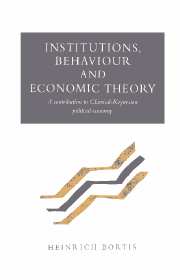Book contents
- Frontmatter
- Contents
- Preface
- Acknowledgements
- Glossary of symbols
- 1 Introduction
- 2 Some basic concepts and issues in the social sciences
- 3 Some basic issues in political economy
- 4 Towards a coherent system of political economy
- 5 Classical-Keynesian political economy and neoclassical economics
- 6 An alternative theory of economic policy
- 7 Political economy in a wider context
- References
- Index
7 - Political economy in a wider context
Published online by Cambridge University Press: 14 January 2010
- Frontmatter
- Contents
- Preface
- Acknowledgements
- Glossary of symbols
- 1 Introduction
- 2 Some basic concepts and issues in the social sciences
- 3 Some basic issues in political economy
- 4 Towards a coherent system of political economy
- 5 Classical-Keynesian political economy and neoclassical economics
- 6 An alternative theory of economic policy
- 7 Political economy in a wider context
- References
- Index
Summary
For philosophical, theoretical and empirical reasons we have suggested that classical-Keynesian political economy is likely to be a superior alternative to neoclassical economics which is, essentially, equilibrium theory and is too individualistic and mechanical. Society, the social structure, is something more than the sum of its parts and possesses laws of its own. Classical-Keynesian political economy also seems superior to the economic theory of centrally planned socialism which sees man uniquely as a part of the social machine and relies too heavily on the possibility of consistently planning economic activities. Because of the immense complexity of the modern world this is impossible. Marx's allusions to an Indian village when speaking of planning production, i.e. directly producing use values (Marx 1973/74a, vol. I, pp. 56–7), simply cannot be taken as a starting point for managing large monetary production economies with extensive division of labour. Centrally planned systems may function satisfactorily in times of war and of crisis. But in normal times, it is not possible to plan prices and quantities without severely disrupting an economic system. Normal prices must not be fixed since these are governed by the distributional institutions which determine the structure of money wages and of profit rates, and by the conditions of production; normal quantities and employment depend on effective demand; long-period employment policy must aim at setting up an institutional framework consistent with full employment (chapter 4, pp. 142–89, and 6, pp. 319–48). The central planning procedure may lead to socially inappropriate prices of production and partly to the production of goods which do not meet the preferences of consumers; both imply, as a rule, squandering labour and natural resources.
- Type
- Chapter
- Information
- Institutions, Behaviour and Economic TheoryA Contribution to Classical-Keynesian Political Economy, pp. 349 - 417Publisher: Cambridge University PressPrint publication year: 1996



